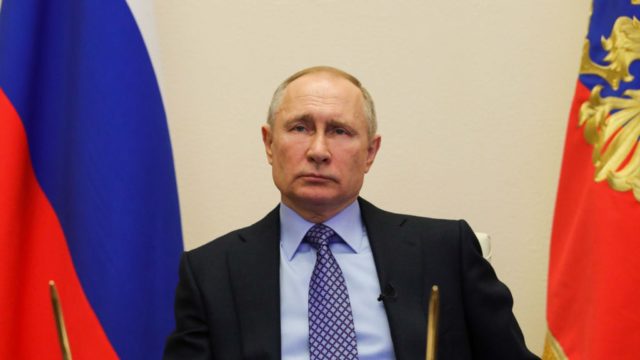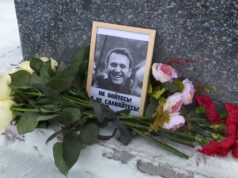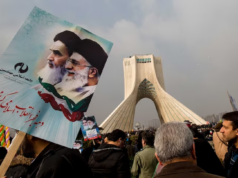Event Date: April 14, 2020
President Barack Obama infuriated Russians in 2014, especially leader Vladimir Putin, by calling the country a “regional power” that seized part of Ukraine out of weakness, not strength. This provoked Putin and his regime to “double down” on their existing efforts to undermine U.S. interests around the world, Russian expert Dr. Stephen Blank told participants in a Jewish Policy Center conference call April 14.
Blank, a former professor of national security studies at the Strategic Studies Institute of the U.S. Army War College, has consulted for the Central Intelligence Agency and is an internationally-known authority on Russia and the former Soviet Union. He said recognizing “the paranoid mindset” is key to analyzing Moscow’s international behavior.
Referring to the “color revolutions” that overthrew authoritarian rulers, sometimes Russian clients, in Ukraine, Georgia, Kyrgyzstan, Lebanon and to the “Arab spring” upheavals of 2011, Blank said “Russians believe all those revolutions were U.S. conspiracies” aimed at Moscow. So Putin’s policies attempt “to thwart U.S. interests wherever possible,” Blank told approximately 200 JPC call listeners.
In the Middle East, Russia is “obsessed” with gaining access to and if possible control over energy supplies, he said. But it suffered “a major defeat at the hands of the Saudis and United States” this week in the oil price war it had begun with Saudi Arabia. Russia has “lost billions of dollar in its attempt to drive Saudi Arabia out of key markets.”
Blank noted that Russia and the Soviet Union before it traditionally have tried to project power beyond their borders. However, the dispatch of troops and mercenaries into the Middle East is simultaneously new for Moscow and an attempt to regain Mediterranean naval bases lost with the collapse of the Soviet Union in 1991.
In the Middle East, the Russians “are not looking for stability,” according to Blank. Rather, they seek to use existing conflicts and incite new ones to “prolong the game” in which all parties look to Moscow as the influential mediator. In Syria, Russia remains determined to see its client, Bashar al-Assad, firmly restored to power after nine years of civil war.
Vladimir and Bibi – It’s Only Tactical
Russia and Israel, or rather Putin and Israeli Prime Minister Benjamin Netanyahu, maintain a “purely tactical” relationship, Blank said. “Russia deters Iran from provoking Israel [and] always has been opposed to Iran having nuclear weapons.” But Moscow also enables Iran, sells weapons to it and its major international surrogate, Hezbollah in Lebanon, and promotes the political recognition of Hamas, the Palestinian Islamic Resistance Movement, a U.S.-designated terrorist organization.
Russian and Turkish interests in Syria, regarding Iran, in Libya and elsewhere both overlap and conflict. That means, Blank said, that “Turkey and other Middle Eastern countries … are doing what they’ve done for the past 50 or 60 years—playing both sides [Russia and the United States] against the middle.”
Putin, a former KGB officer, in 2005 called implosion of the Soviet Union “the greatest geopolitical catastrophe of the century.” Blank said Russian activities, whether in arms sales, dispatch of military forces—as to Syria and Libya—information warfare, energy and diplomacy should be understood as part of an overall attempt to recoup the great power status and influence lost with the Soviet downfall.
Russia carried out an “impressive” military modernization over the past ten years, Blank said. Improvements include “terrific missiles of great lethality,“ submarines with “imposing range” and a renewed nuclear arsenal. But even before the coronavirus” pandemic the upgrades “hit a ceiling,” he asserted.
Blank does not believe Russia can deny U.S. forces access to European NATO allies or NATO’s movement to an eastern European front facing Putin’s military. Nor does he think it could stop northward support of non-NATO states Sweden and Finland. Moscow could “inflict immense damage” on such forces if through miscalculation it precipitated armed conflict. But it would not prevail, he said.
Nevertheless, “Russia has been waging war on NATO since 2005,” when the defense minister publicly declared that to be the case, Blank said. Given Kremlin paranoia about outside threats—historically useful to Russian leaders worried about domestic complaints and aware of their own political illegitimacy—information warfare and cyberweapons are aimed at Western countries every day.
Relentless Subversion
“They keep coming at us … even without success,” Bland said. Such rally ‘round the fatherland aggression is “the only way they can survive … to postulate a threat and fight it.”
Putin “wants to subvert the Baltic governments, pressure them and reorient them toward Russia” and away from the United States and the West. But Blank doesn’t believe Russia will risk war with the West by attacking Lithuania, Latvia or Estonia.
Although Russia’s economy already was brittle, it’s now under “a double whammy of low oil prices and the corona virus.” The pandemic’s effects in Russia “are worse than they are admitting,” Blank said. He noted that “medical care in the provinces is not good.”
With oil revenue plunging and many Russians out of work, Blank said he did not see how Putin could continue to pay for great power adventurism without high inflation. However, the Russian leader “is a deficit hawk” who might resist accumulating even greater debt. There “will be more social discontent,” Blank said, but if there were a likely challenger to Putin in Russia, that person is keeping a very low profile.
Russia suffers demographic decline, but Blank does not anticipate a population collapse. Yet, along with warming brought by climate change “with the potential to devastate the Arctic and Russia itself,” Moscow already must accommodate itself to China, its far eastern neighbor.






